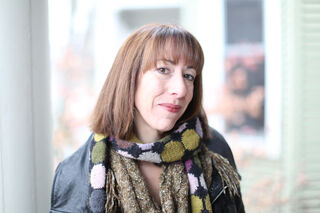Coronavirus Disease 2019
Gina Frangello: Final Act
Seizing the moment with a Zoom pop-up wedding.
Posted August 9, 2020 Reviewed by Ekua Hagan

A guest post by Gina Frangello.
We didn’t even know how to use Zoom until an hour before, but here we were sending out Zoom invitations to our pop-up wedding—an event that was originally supposed to happen in June in California and would take place in less than 24 hours, on March 24, 2020, in our Chicago living room. Rob and I hadn’t even yet written vows. The wedding dress I’d bought for summer needed to be professionally taken up and tailored. The only people who would be in attendance for the ceremony were my three kids from my first marriage, all home with us during the COVID-19 quarantine, and our makeshift officiator: the drummer in Rob’s band.
Truth is sometimes described as being surprising at first, but inevitable upon reflection. And the truth is that absolutely nothing—in the eight years of our relationship—had ever gone as planned.
Rob and I met more than 20 years ago when he submitted a short story over the transom to the nonprofit literary magazine I then edited. Over the years, we crossed paths randomly: He was the runner-up in a contest when we launched a book press; we published another story of his in the magazine; finally, we accepted a novel of his for publication, which was released in 2013.
By then, we were a year deep into a passionate and clandestine extramarital affair.
We had both been married forever—two decades, give or take a few years, apiece. Although our marital relationships were radically different from one another’s, neither of us had ever cheated on our spouses prior to our affair. We spent some three years “ending it” with one another but repeatedly falling back together before finally, reconciled at last to our inability to cleave, we each confessed to our spouses. Though we of course expected devastating fallouts, in retrospect we had little idea how wide-ranging and brutal the fallouts would truly be.
Rob lived in LA. His literary, music, and recovery communities were all in Southern California, as well as almost constant sunshine that helped the depression that was a frequent byproduct of his ultradian bipolar disorder. I lived in Chicago with my three kids and the two elderly parents I’d been caretaking for nearly a decade.
Following the revelation of our affair, my two eldest children understandably wanted nothing to do with Rob and essentially told me: Do what you want, but don’t bring him around here.
For the nine months after I told my ex-husband about the affair—even when he began dating, found a serious relationship, and got engaged—Rob had still never spent a night with me in my family home. We were, plain and simple, homewreckers, and it did not occur to us to challenge the imperative that he stay away.
Rob spent his scant income flying to Chicago for short intervals when we could stay at the “nesting pad” my ex and I time-shared the first nine months of our separation. I rarely wanted to be away from my kids for longer than a few days at a stretch, so he would fly to Chicago and then back to his ex’s apartment in Southern California with preposterously short turnovers, while I was working overtime to try to normalize my children’s lives amidst an increasingly contentious divorce. Even when my father—who lived downstairs from us—died, I kept Rob tucked away at “the pad” out of shame and didn’t bring him either to my father’s bedside vigil or the memorial service. I was living my life in atonement mode.
Then, I got breast cancer. Seven months after my marital separation and two months after my father’s death, I was diagnosed, and about six weeks after that, Rob spent the night with me in my family home for the first time and stayed—for a month and a half—while I underwent a bilateral radical mastectomy. It was then that my kids were able to see him caring for me—stripping my mastectomy drains and going with me to doctor appointments and doing all the household chores—and slowly began the process of forgiving, accepting, and beginning to bond.
My surgery was successful; my margins were clean, and Rob’s and my intense attraction and connection had more than survived my body’s alteration. When he left Chicago in late February 2016, it was with a plan to move back full-time the following month.
Then, before we could even share our news with family and friends, Rob’s ex also received a diagnosis: breast cancer. The blow was horrifically timed—my Mammaprint and Oncotype DX scores had just come back, unexpectedly, as having a much higher risk for cancer recurrence than my oncologists had anticipated, and suddenly my doctors in Chicago (and a second opinion at Cedars-Sinai) recommended chemotherapy. Rob’s ex did not have the support system that I had, and so he began a crazy-making period (for us all) of commuting back and forth from LA to Chicago, living half time in each place taking care of a sick woman, spending his time at medical facilities.
Though Rob had been compliant in his treatment for bipolar for many years, his depression escalated in this period to a “red zone,” in the words of his LA psychiatrist. Eventually, his ex and I were each given a good prognosis, and Rob began new treatments for his depression and entered a period of healing and growth, too. Finally, the relationship we had expected to enter way back in early 2015 when we had first told our spouses about the affair, could begin.
At the very end of 2017, Rob relocated to Chicago full-time. Soon afterward, I had a full hip replacement due to a combination of chemo side effects and osteoarthritis genetics; my daughters went off to college in California, which had by then become our second city; and my beloved mother died. Through all of these hardships, Rob was by my side, holding me up, helping me find laughter, and still making my body surge in ways that defied menopause and the alleged “invisibility” of the middle-aged American woman.
Rob and I met when we were both youngish, both healthy—when life was as easy as it was ever going to be. Now here we were, in the middle of a global pandemic, my daughters back from California to shelter-in-place with us, our youngest child home from a shuttered elementary school. Then, in yet another coincidence of timing, Rob’s divorce papers suddenly arrived in the mail. Amidst the terror that our government would not protect us and that our medical system would end up collapsing under the weight of COVID-19, it was abundantly clear that all we wanted was to be married—to face this crucible challenge together as husband and wife.
“Are you sure you don’t want to get married in California later on?” I asked more than once. “You can add me and the kids to your insurance as a domestic partner now that you’re divorced — we don’t need to get married right away.” The HMO that both my youngest child and I were on had been a cause of concern since the virus began casting its shadow; we could only be seen by one medical facility, and already they were becoming overwhelmed. But I also knew that Rob had changed his entire life to be with me, and California remained a magical place to him where he longed to celebrate our wedding with his longtime community: a beach ceremony followed by an offbeat reception at his favorite dive bar.
“I don’t care about any of that,” he reassured me, smiling at me while the world collapsed around us. “I’m marrying you. I’m the luckiest man in the world.”
“At least do it on Zoom!” a close California friend admonished us, to which we mutually groaned, “We don’t understand Zoom.” And so he walked us through it, then and there, the night before the wedding. Of the 82 Zoom invites we hastily sent, some 70 friends and family “attended” the following evening at 5:30 p.m., weak, half-gray Chicago daylight still lighting our living room.
I chose a dress I’d worn on our dream trip to Paris, along with my daughter’s Doc Martens combat boots; Rob wore a too-big blazer one of his students had once taken off and given him impromptu at a party. Some of our virtual guests donned swanky hats and long white gloves above their pajama bottoms. And there, in our shared home, in front of so many people who had witnessed our journey—both the harrowing and the beautiful parts—we promised to have each other’s backs, to be each other’s final acts, and to, as Rob tells me every day, never take a moment of our incredible life together for granted.
The day after our wedding, Rob, who had been sick on and off since early March and had already tested negative for the flu, grew worse. He soon developed the fever, the dry cough and wheezing, the fatigue, head and neck pain that were warning signs of COVID-19.* I was ill too, though less severely—I was able to sit at my computer, working, during the height of our common sickness, while he spent his days mainly sleeping, out of breath from everyday tasks.
Slowly, both our bodies recovered, and life resumed the rhythms of our world’s New Normal—for our honeymoon, three months delayed, we social distanced together at our friends’ unoccupied farmhouse in Wisconsin, prepping simple meals with ingredients brought from home and relishing four rare days of alone time and the miraculous ability to enjoy the outdoors on solitary acres of land without masks. For my first honeymoon at 25, I’d spent a whirlwind month in Europe, two friends tagging along. The stark contrast reflected not only the difference in our world now, but perhaps also a deeper difference inside of me, at 52, and the beauty I have come to find in simpler things, in quiet spaces, in one-on-one intimacy without the constant need for activity, variety, and noise.
Marriage—perhaps especially for those who have been through divorce and no longer believe themselves immune to the darker fallouts of love—is fundamentally a leap of faith, radical trust, and hope. While both Rob and I fully hope to outlast this turbulent period in world history—to be standing on the other side among those who remember together—we are also not young, have both had underlying medical conditions, and, in our story of the unexpected, taking nothing for granted also entails a full understanding of the transience and impermanence of life. We are careful—we work to keep those we love safe—but we also reject the idea of any time being merely a “holding pattern.” This period of COVID-19 is not the waiting room before a long-married life we assume as a given: This is life, and we live fully in each moment, seizing opportunities for joy.
Much of why we traveled this arduous road to togetherness, when either one of us would have had plenty of cause to reverse courses and give up, was exactly for this reason: In both our brightest and darkest hours, we are now exactly where we want to be.
*The author and her family tested negative for COVID-19 once tests became widely available in Illinois.
Gina Frangello's forthcoming memoir, Blow Your House Down: a story of family, feminism, and treason, will be published on Counterpoint in April 2021. She is the author of four books of fiction, most recently including Every Kind of Wanting and A Life in Men. She is the faculty editor of the Coachella Review, and has previously served as an editor at Other Voices Books, The Rumpus, TriQuarterly Online, and the Nervous Breakdown. She is finishing her Ph.D. at University of Illinois Chicago in the Program for Writers.




